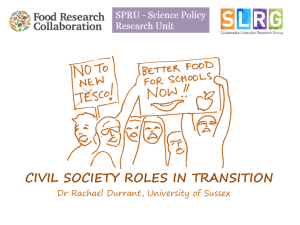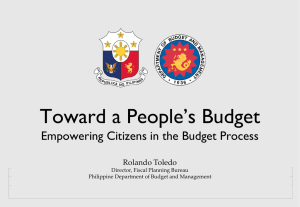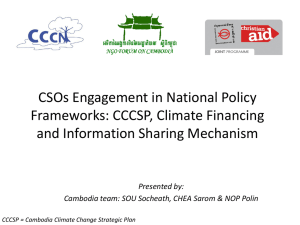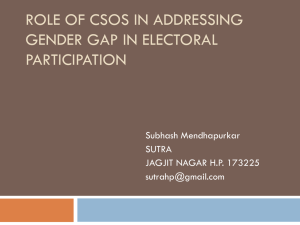CSOs: Status, Challenges and Democracy in the Arab World
advertisement
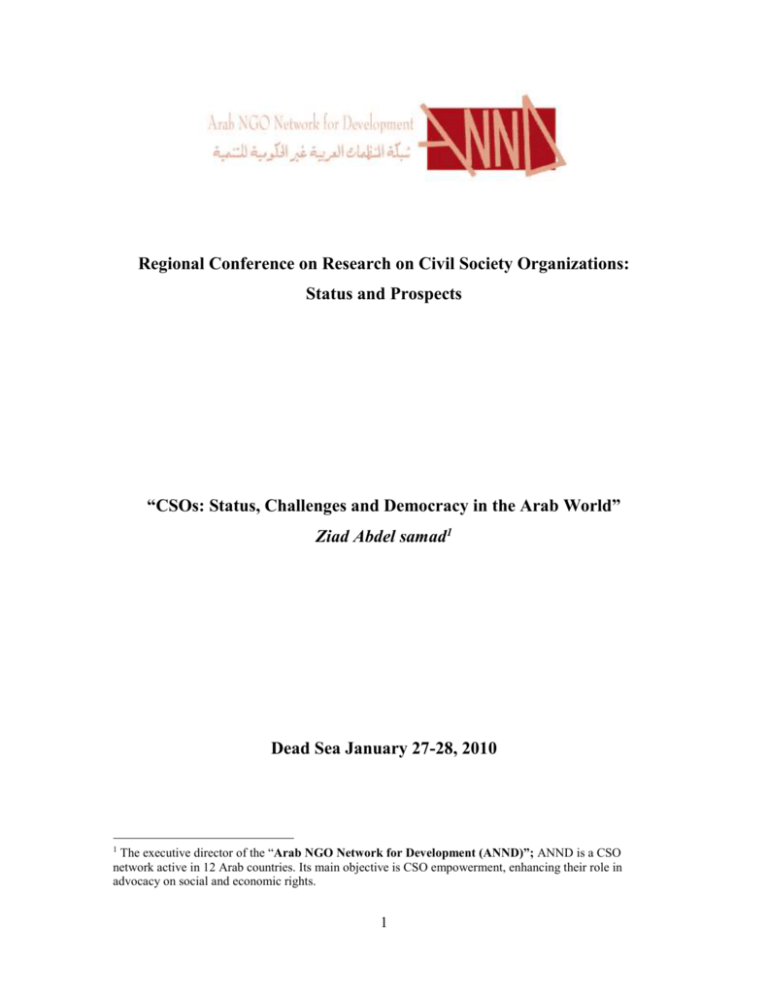
Regional Conference on Research on Civil Society Organizations: Status and Prospects “CSOs: Status, Challenges and Democracy in the Arab World” Ziad Abdel samad1 Dead Sea January 27-28, 2010 The executive director of the “Arab NGO Network for Development (ANND)”; ANND is a CSO network active in 12 Arab countries. Its main objective is CSO empowerment, enhancing their role in advocacy on social and economic rights. 1 1 Overview It is not an easy task to present an overview of the research on civil society in the Arab region since the number of published documentation and analyses is very limited. Consequently, there is a need to enhance the relation between civil society actors and academia towards concerted and constructive efforts. However, the lack of clarity and the confused understanding of the concept of civil society lead to mixed conclusions. It is worth noting, that even globally, most of the academic work on Civil Society Organizations (CSOs) is still limited to a selected few western institutions such as the London School of Economics, the University of Gutenberg, John Hopkins University, University of California, Los Angeles, SIGI center in the Waterloo University-Canada. 2 Introduction Discussions of research on Civil Society Organizations in the Arab region generally attempt to provide a better understanding of their role and the challenges facing them; they tend to assess their historical and various structural and organizational aspects. Many efforts were carried out to identify their internal governance, their sources of funding and their credibility and effectiveness. However, they rarely attempt to evaluate their performance, vision, mission and particularly their strategies and impact. Similarly, CSOs face political and social obstacles, including but not limited to the lack of democracy as it is mistakenly acknowledged; but also to other issues; one of which is the traditional (classical) understanding of civil society and its role. The role of CSOs in both its traditional understanding and practice is perceived to be limited to philanthropy and service provision. This perception deprives them from the freedom and the capacity to develop their own advocacy strategies as active agents of change. CSOs also suffer from the way they are perceived by other social and political actors, which considerably limits their action. In order to evaluate the existing research effort along with its objectives and relevance, it is imperative to identify the challenges and obstacles that CSOs in the Arab region face. They should help CSOs to better understand these challenges and the way to face them. These research efforts should seek out the empowerment of CSOs, enabling them to be strong partners in different stages of the decision-making process, in service delivery and in the struggle to improve the living conditions of the people as well. 3 The paper will highlight the main challenges that CSOs are facing, and thus the main topics addressed by the researches. It will present recommendations dealing with the missing dimensions of research efforts. Where are we today? The concept of Civil Society in the Arab region is a highly controversial topic. Only a few analyses were engaged to elaborate a common understanding of Civil Society. Nevertheless, the emergence of this phenomenon varies from one country to another depending on political, economic, social and cultural factors. A quick overview of the reality of the region indicates that the aforementioned factors prevent the smooth emergence of civil society in most countries. Indeed, there are multiple obstacles facing civil society, including a lack of democracy, instability, excessive centralization in addition to a lack of tolerance and cultural diversity. Moreover, the persistent security threats rising from internal conflicts and foreign occupation are sharply affecting the capacities as well as the role of civil society. Consequently, the performance and the impact of CSOs are very weak and limited. In addition to the aforementioned challenges, it is worth noting the relations between CSOs and the power structure, such as ruling families, governments, and political parties in power to name a few. It is important to investigate the financing and privileges accorded to some CSOs by these power structure including private capitals and the ways CSOs subsequently work to accommodate it. 4 Besides these factors limiting the adequate role of CSOs, there exist many other obstacles. Among these obstacles is the weak level of networking between CSOs, the lack of reporting on their own activities, as well as the lack of permanent structures, either academic or governmental, dedicated to studying and monitoring them. One question which would be most enlightening is the process of formation of CSOs: do they start as popular movements that are later institutionalized, as initiatives from social or academic elites, as professionals responding to foreign funding, etc... However, the perception of CSOs had developed through different phases. They were initially considered as philanthropists and sometimes partners in service provision. They then were perceived as to be efficient intermediary actors able to reach out to different groups, especially the most vulnerable in addition to their ability to fill the gap of geographic disparities. Furthermore, CSOs are perceived to be major players in countries in crisis who respond to the immediate needs and challenges enabling them to have a leading role during times of hardship. Recently, CSOs started to be perceived as increasingly important actors for change by proposing alternatives, fostering democratic practices and identifying methodologies to enhance coordination and networking. In addition, CSOs in the Arab region are negatively viewed, both by the political groups in power and those in the opposition. It is obvious that most political movements, including those in power, share the same impression on CSOs. They are suspicious of the very notion of Civil Society, its role and objectives. This is founded on the basic belief that CSOs are a western creation. They believe that CSOs are imported to distort the political 5 struggle from its main causes and thus, they are not welcome unless they fall directly under the control of the regime. In short, governments believe that CSOs are a real threat to their power, while opposing political movements and parties accuse them of being responsible for the divisions and weaknesses amongst them. Moreover, CSOs are not very well perceived by other social actors either, such as media, academia, social movements including youth organizations and trade unions; this is mainly because of confusion in their understanding of CSOs. In addition, there is a gap between civil actors and think tanks, research centers and academia. Consequently, bridging the efforts among all these actors is a must in order to have a more useful and valuable role. They should focus on the challenges that CSOs are facing. They should identify these challenges, and come out with concrete and practical recommendations helping CSOs to overcome these challenges. Consequently research must respond to the challenges that CSOs in Arab countries are facing. They should draw the road map to overcome these challenges and to improve performance and purpose. They can suggest alternatives and options enabling CSOs to improve performance and increase their role. The challenges that CSOs are facing can be divided into two main groups; the first group is related to the limitation of their role to service provision within a context where there is a real lack of comprehensive social policies and the willingness to coordinate and to create networks. In this context, the priority should be given to strengthen the advocacy role of civil society, which necessitates tools and resources, in addition to the capacity to build coalitions and alliances. It is also crucial to elaborate clear vision and strategies. 6 The second group of challenges is the external environment that is related to the restrictions imposed by the legal frame-work, the way it has been implemented, the poor level of development, the centralized and totalitarian nature of the state and finally the security and instability in most of the countries. This reality requires more elaboration on the role of civil society in facing the challenges including the one of peace and security. It is also a challenge for CSOs to be efficient and responsive in an environment characterized by poor conditions and lack of proper infrastructure. Who are the organizations we are speaking of and writing about? It is important to define CSOs as a subject of research in an attempt to unify its understanding. However, for the purpose of this paper, the definition given by “The London School of Economics” is used. It states Civil Society is “the arena of un-coerced collective action around shared interests, purposes and values. In theory, its institutional forms are distinct from those of the state, family and market, though in practice, the boundaries between state, civil society, family and market are often complex, blurred and negotiated. ” “Civil society commonly embraces a diversity of spaces, actors and institutional forms, varying in their degree of formality, autonomy and power. Civil societies are often populated by organizations such as registered charities, development non-governmental organizations, community groups, women's organizations, faith-based organizations, 7 professional associations, trades unions, self-help groups, social movements, business associations, coalitions and advocacy group”2. In other words, this definition clarifies the idea that Civil Society as an arena between the state, the market and the family and thus the individual actors and the institutional forms active within this arena. Beyond this definition, much research and many surveys were conducted during the last two decades, and many conferences were organized to discuss the role and the main characteristics of CSOs. They often tackle their quantitative dimensions, focusing on the legal framework, numbers, classifications, internal structure and governance. Most of the research tends to suggest the adequate legislation with the aim of securing their freedom and their independence from the state and political polarization. However, and because of the wrong conceptual understanding of civil society, none of the efforts endeavor into real qualitative political, economic, social and cultural impact. The legal frameworks in most of the Arab region are very restrictive and tend to impose limitations on CSOs’ ability to be independent. However, very little research tackles the regulations organizing CSO participation in the decision-making processes and policy formulation. This should be an important subject to be identified in order to secure a structured, institutionalized and sustainable engagement of CSO. The most common research effort is on democracy and tackles the nature of the state, governance issues, decision-making processes, and transparency as well as many others. There are even many emerging observatories to 2 "What is civil society?” Centre for Civil Society, London School of Economics. 2004-03-01. 8 measure the level of democracy. However, little research exists to evaluate CSO effectiveness and to assess their impact on the political, economic, social and cultural life. 9 Recommendations The actual use of research by CSOs, which is still very limited, and if increased could enhance their interventions, effectiveness, policy impact, credibility with official parties…even dialogue among themselves. This point raises another dimension of the challenges which is the deficit in the cross relation between CSOs and academics, through which more research activity can be fostered in the region. However, this should also take into consideration the very limited experience of think tanks, and the possibilities for issue oriented CSOs and NGO to be incubators of such think tank experiences. Civil and political actors, academia and think tanks exert efforts to understand the phenomena and to help in developing its concept. However, most of them focus on the quantitative aspect rather than further elaborating on the qualitative one. This fact leads to the conclusion that the research should not only focus on the quantitative aspects and the overall political and democratic contexts, but it should also shed a light on the policy issues and policies in the region from a rights-based approach and they have to measure and to assess the impact of CSO, as a tool to evaluate the role, the methodologies and the way to improve this role. It is also important to enhance the advocacy role of CSO which means that research should be used as advocacy and lobbying materials and equip CSOs to take on this role. Researches should shed the light on the funding processes and policies, by examining and analyzing the impact of donor money and the role of foreign development aid agencies in the progress of the role of CSOs, while most of the focus is on the internal dynamics in the region. 10 Networking is the tool for empowerment and fostering advocacy, however, research should Have more insight into the networking experiences, although not from a subjective point of view, but from a constructive and comprehensive perspective. Research efforts should serve in the empowerment of the civic participation in the different phases of the decision making. However, this participation is not limited to the legal framework and the political willingness, but it also requires efficient and viable regulations for enhancing and institutionalizing civic participation and engagement, on one hand, and establishing monitors to produce periodic documents serving as tools to empower the engagement of CSO in policy making on the other hand. Finally, fostering relations between civil society and think tanks, research centers and academia is an important factor for them to increase their influence and to disseminate knowledge among the society, this relation should find ways to be more interactive and institutionalized for the sake of a mutual benefit positively impacting the society as a whole. 11


